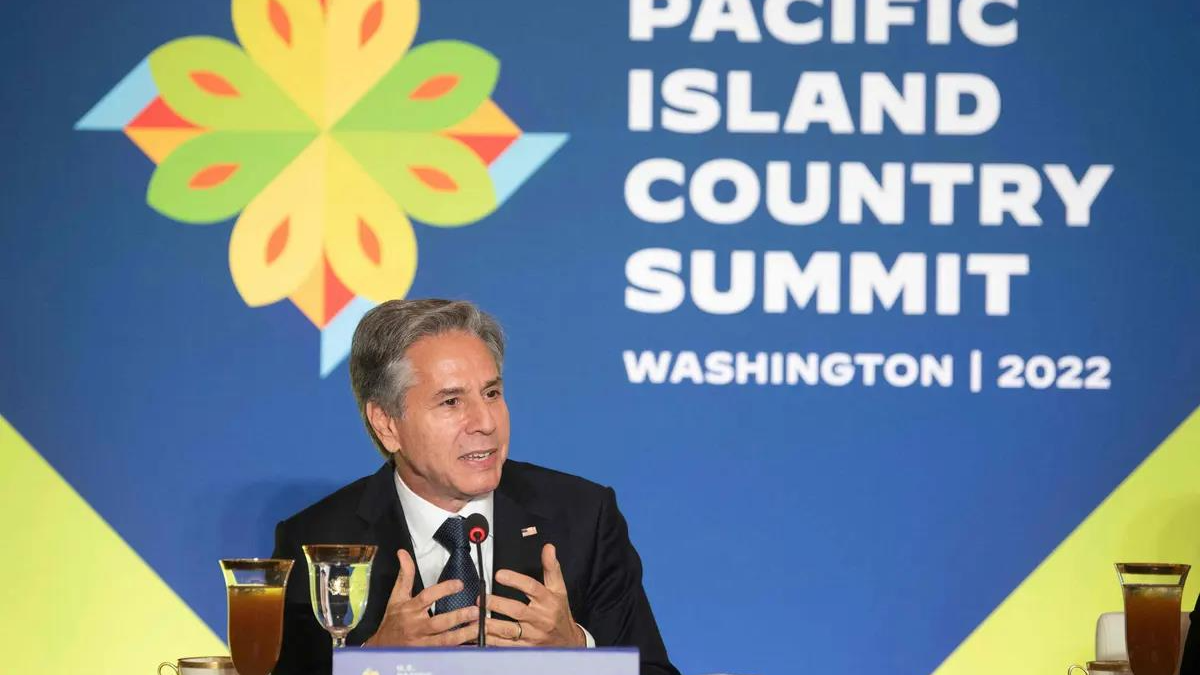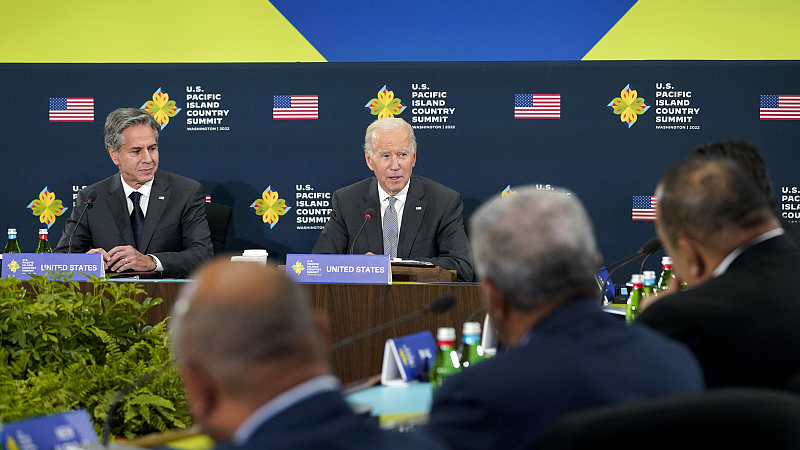
U.S. Secretary of State Antony Blinken speaks during a working lunch at the "U.S.-Pacific Island Country Summit," at the State Department in Washington, D.C., the U.S., September 28, 2022. /Getty
U.S. Secretary of State Antony Blinken speaks during a working lunch at the "U.S.-Pacific Island Country Summit," at the State Department in Washington, D.C., the U.S., September 28, 2022. /Getty
Editor's note: William Jones is a former White House correspondent for Executive Intelligence Review and a non-resident fellow of the Chongyang Institute for Financial Studies, Renmin University of China. The article reflects the author's opinions, and not necessarily those of CGTN.
Not since 1942 has the attention of the United States been so focused on the islands in the Western Pacific, except for Guam, which has become a veritable fortress for the American heartland. But with the new Indo-Pacific strategy, these countries now retain a crucial strategic significance.
The new interest in the region has been engendered by an all-out attempt by the Joe Biden administration to stem the growing global influence of the People's Republic of China. Following the security cooperation between China and Solomon Islands last year, the U.S. and its allies in the region, Australia and New Zealand, have pulled all stops to bring these countries on board a U.S.-backed thrust to contain China.
The island nations are receiving U.S. "red carpet treatment": They had lunch with members of Congress, including House of Representatives Speaker Nancy Pelosi, and dinner with President Joe Biden. Washington also pledged more funding to the tune of over $800 million to tackle climate change and "maritime security," although what the latter will entail could indicate a more than philanthropic aspect to this initiative. On the U.S. Pacific Island Country Summit, leaders or representatives came from the Cook Islands, Fiji, French Polynesia, Micronesia, Marshall Islands, New Caledonia, Palau, Papua New Guinea, Samoa, Solomon Islands, Tonga, Tuvalu, Nauru and Vanuatu. Australia, New Zealand and the Pacific Islands Forum Secretary General attended as observers.
The Biden Administration issued a new document on September 29, outlining its policy for the region in line with the new Indo-Pacific strategy, in order to bring these countries into a working relationship with the administration's policy as a branch of the "alliance of democracies." "U.S. prosperity and security depend on the Pacific region remaining free and open," the document notes that Pacific island countries faced urgent challenges, most notably from the climate crisis, but also heightened geopolitical tensions.

The U.S. President Joe Biden speaks during the first U.S. Pacific Island Country Summit at the State Department in Washington, the U.S., September 29, 2022. /CFP
The U.S. President Joe Biden speaks during the first U.S. Pacific Island Country Summit at the State Department in Washington, the U.S., September 29, 2022. /CFP
It says, "those impacts include pressure and economic coercion by the People's Republic of China, which risks undermining the peace, prosperity, and security of the region, and by extension, of the United States." Here we have some of the real motivations behind this initiative. The strategy also calls for expanding the presence of the U.S. Coast Guard, National Oceanic and Atmospheric Administration and Pentagon.
While they will talk much about helping the environment in these hard-pressed countries with the rise in sea levels and a lack of economic development, the ultimate goal is to maintain these areas as a U.S. "sphere of influence" and potential jumping-off point for U.S. military operations in the region. While the Peace Corps has been invited to the conference, the delegates will also speak with the U.S. Coast Guard, which has expanded its operations from the coast of the United States to the Western Pacific.
The Biden administration remains intent on having a statement issued from this summit, which would confirm the islands are working together in the same direction as the U.S. Nevertheless, the Solomon Islands, which has security cooperation with China, said it was not prepared to sign such a declaration, although U.S. Secretary of State Antony Blinken has indicated they would be on board with it. Hence, what will the real declaration say remains to be seen.
Officially, U.S. rhetoric has focused more on the need for assistance in the fight against COVID-19 and climate change, but there is much more here than expressing humanitarian concerns for these island nations. The declaration signed by the Pacific Island countries is not the same as the U.S. strategy document.
The leaders of these nations are no doubt happy that the U.S. is finally prepared to help them and are willing to bend a little to receive this economic assistance, but there is "no love lost" between some of these nations and the United States. The Marshall Islands, for instance, remains reluctant to renew a strategic partnership agreement with the U.S. given the fact that atomic testing in the 1940s and 1950s on the islands had created major health and environmental problems for which they felt they had not been duly compensated. To beef up its presence in the region, the U.S. will open new embassies in the Solomon Islands, Tonga, and Kiribati.
(If you want to contribute and have specific expertise, please contact us at opinions@cgtn.com. Follow @thouse_opinions on Twitter to discover the latest commentaries in the CGTN Opinion Section.)